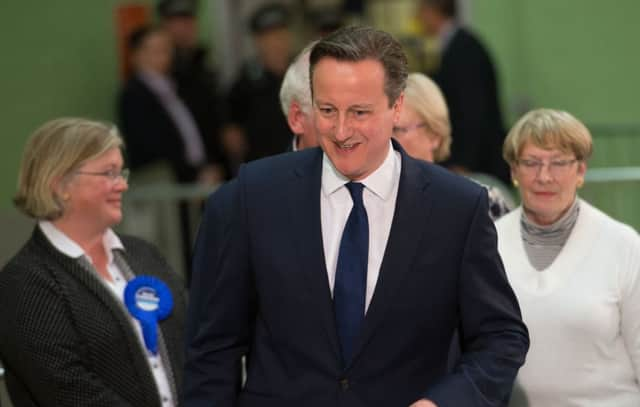PM can’t rest on his laurels as EU poll looms


The prime minister has said he wants to stay in Europe but is demanding changes to the UK’s deal with Brussels before endorsing a Yes vote.
The EU is the major trading partner for most UK firms, which are concerned about the prospect of any disruption to the single market. The likely date for a referendum will be 2017, although Mr Cameron will come under pressure from eurosceptic Tories to act swiftly.
Advertisement
Hide AdAdvertisement
Hide AdTwo years of intensive negotiations with EU partners now lie ahead over Mr Cameron’s demands for changes to rules on the rights of EU citizens to settle, work and claim benefits in the UK, as well as removing Britain from the aspiration of “ever closer union”.
If he achieves a satisfactory renegotiation, he has said he will fight for Britain to remain in the EU in the referendum – something which will put him at odds with many in the Conservative Party.
David Watt of the Institute of Directors in Scotland said: “In large part most businesses are concerned because nine out of ten of the export destinations for British firms are the EU.”
But Mr Watt said that there are concerns among some firms about EU red tape in areas such as employment law, and would welcome reforms.
John Cridland, CBI Director-General, added: “With an EU referendum now likely, business will now want to see an ambitious, achievable reform agenda that will make both the UK and Europe more competitive and prosperous for all.
“The majority of businesses want to stay in a reformed European Union which opens up the world’s largest market of 500 million consumers.”
The new Conservative government is also expected to introduce reforms to ensure that House of Commons matters affecting only England, or England and Wales, are decided by MPs from those nations.
The so-called EVEL (English votes for English laws) proposals were unveiled the day after the Scottish referendum and have provoked widespread concerns that it will create “second class” MPs from Scotland.
Advertisement
Hide AdAdvertisement
Hide AdThe prime minister has also made it clear in his first comments after winning the election that preserving the United Kingdom will be at the heart of his agenda.
He committed himself to pressing ahead with the devolution of powers proposed by the Smith Commission following last year’s failed independence referendum – and possibly going further.
“I want to bring our country together, our United Kingdom together, not least by implementing as fast as we can devolution that we rightly promised with other parties, both for Wales and for Scotland,” he said.
With the SNP winning 56 out of Scotland’s 59 seats, Mr Cameron will face difficult negotiations with the Nationalists, who want to see the current proposals for more devolution significantly enhanced, with deputy leader Stewart Hosie suggesting it could prove the catalyst for a second independence referendum.
The renewal of the Clyde-based Trident nuclear weapons system is now a certainty with the Tories committed to a new generation of the submarine-based set-up, despite this being opposed by the SNP. Mr Cameron has also promised to protect defence equipment budgets, and will now come under intense pressure from backbenchers to commit to Nato.
The “climate of austerity” which characterised the coalition since 2010 is poised to continue for another two years with Chancellor George Osborne having pledged to eliminate the UK’s state deficit by 2017-18 and run a surplus before the end of the parliament. Welfare is expected to suffer with plans to extend the freeze on working-age benefits for two years and to reduce the annual household benefit cap from £26,000 to £23,000, but independent economists say this will save only around £2 billion of the planned £12bn welfare cuts.
With pensioner benefits excluded and Tories promising to protect the “vulnerable”, Mr Cameron will face an awkward task finding the remaining savings amid speculation revolving around cuts to elements of child benefit and housing benefit.
The decision to protect health, international aid and defence equipment will likely mean deep cuts to other areas, such as police, local government and transport, with the Institute for Fiscal Studies suggesting that unprotected departments could face further cuts of 20 per cent or more – bringing total budget reductions since 2010 to around 40 per cent.
Advertisement
Hide AdAdvertisement
Hide AdMr Cameron built his election platform on a promise to continue with the “long-term economic plan” which he credits for injecting growth into the economy and fuelling recovery following the 2008 financial crash. He made clear in his post-poll comments that this will include measures to boost jobs and create three million apprenticeships, and he is also expected to offer cuts in red tape.
High earners can also expect more tax cuts with Mr Cameron pledging to increase the level at which workers begin paying income tax from £10,600 to £12,500, and to increase the threshold for the 40p higher rate of tax from £41,865 to £50,000.